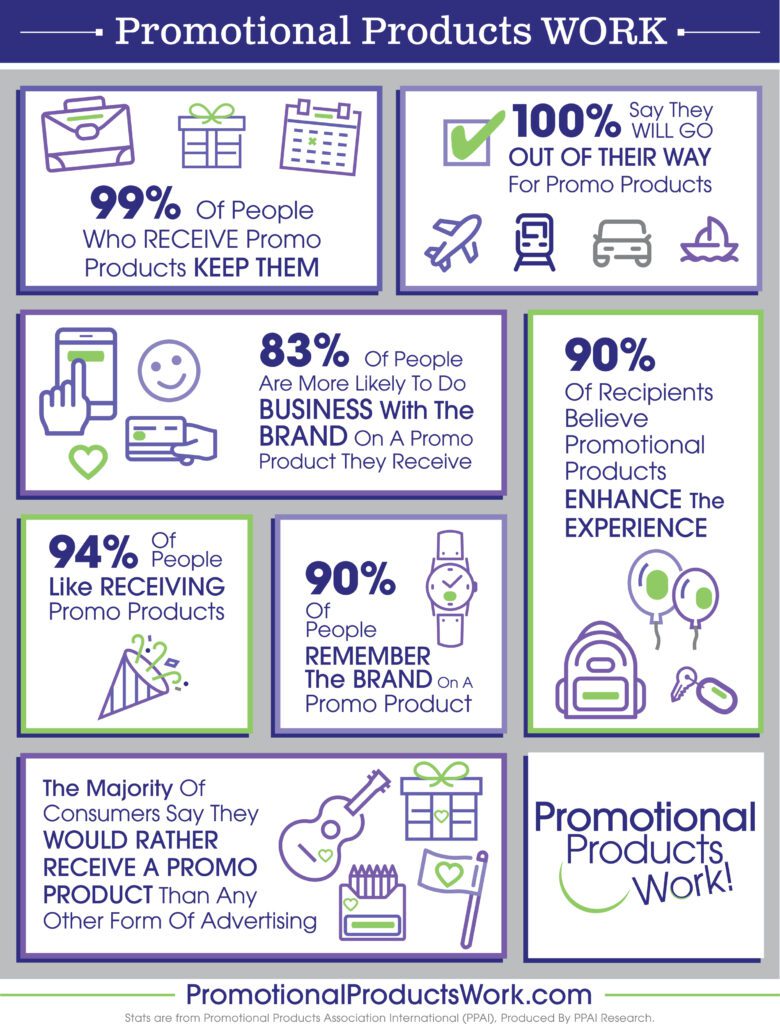The Effectiveness of Promotional Products
Whether you call it swag, branded merchandise or a promotional product, there should be no mistaking the facts… promo products incentivize and influence people to take action!

Whether you call it swag, branded merchandise or a promotional product, there should be no mistaking the facts: Personal, physical advertising is effective, wanted and appreciated. It incentivizes, influences, or reminds the recipient to take a desired action, and is a vital part of any comprehensive marketing or communications campaign.
Promotional products are branded products you give to customers, clients, or employees. They’re an effective marketing strategy because they increase brand awareness. People feel an instant connection with the brand when they receive promotional products – they will walk out of their way at events to pick one up, buy promotional products to earn points and even say thank you.
Half the respondents to the Promotional Products Association International (PPAI) 2021 Consumer Study Report said they kept company swag for over five years, and 70% kept these items for over one year. That’s staying power!
Why Promotional Products Work
Research shows that promotional products effectively increase brand awareness. When you invest in a marketing tool that engages your audience, you’ll remain front of mind when they need your product or service.
Here are some facts and figures to know:
- Promotional products are the most highly viewed form of advertising among consumers.
- 76% of people recall the name of a brand on a promotional item.
- Offering promotional merchandise within a bundle at checkout, as a gift with purchase, sells more of the product than if it were discounted alone.
- American businesses spend $20 billion each year on promotional products. The world’s biggest companies use these tools to build customer loyalty, spread their advertising messages and more. They use them to connect with customers, tell the brand’s unique stories, say thank you and motivate specific actions, all while increasing the brand’s awareness, recognition and equity.
The best way to understand the effectiveness of this marketing method is to ask the people who receive promotional products, from stainless steel drinkware such as coffee mugs and tumblers, to functional tech accessories like flash drives or chargers, to fashion-forward apparel such as sweatshirts with a company’s logo.
PPAI, a non-profit trade association, conducts consumer studies to provide an inside look at how people engage with promotional products, what they think about them, and why they work as an advertising medium. In PPAI’s 2021 Consumer Study Report, 94% of participants said they like receiving promotional products. Promotional products also make experiences more enjoyable, according to 83% of participants. Additionally, three out of four participants said they would likely switch brands if they received a promotional product from a brand they hadn’t done business with previously.
Not only are these branded items effective at influencing the people who receive them, but they can expand your reach to others you may not have considered, as 63% of participants in the consumer study said they’ve passed along a promotional product they received to someone else. What business couldn’t use more referrals?

4 Benefits Of Using Promotional Products
Promotional products deliver much more than an equal return on investment. They are truly effective advertising. But, as with any other aspect of your marketing campaigns, integrating promotional products requires careful consideration and strategy. Consider your target audience and choose useful items to distribute so recipients keep them longer and share them with others.
Here are four key ways promotional products work to help you build your brand:
1. They make a lasting impression.
Digital advertisements only stay in front of someone’s eyes for a moment. When you add promo products into the mix, you provide a longer-lasting impression. Finding ways to incorporate promo products into your digital marketing can turn a limited advertisement into a more intriguing one. Then when consumers use your brand’s promotional products, they’ll remember your company and may even tell their friends and online followers about you.
2. They increase brand recognition.
Give promotional products to potential consumers who may not know about your brand. When they receive your product, they will be curious about who you are and search for your brand name online. Offering promotional products increases brand recognition, leading to future sales. These marketing tools can be used to change perceptions of your brand, as well. A healthcare company might think beyond typical offerings to promote wellness and physical activity, branding items such as sport bottles or wellness gift sets, but there are truly a multitude of ways promotional products can be integrated. The same healthcare company could add its logo to the packaging of healthy gourmet snacks in a welcome kit for conference attendees – an example from one recent award-winning promotional campaign.
3. They deliver massive ROI.
Promotional products are one of the most cost-effective forms of advertising because of the huge impression they make on those who receive them. Companies spend thousands on digital marketing without knowing what their return on investment will be. When you buy promotional products, you can feel confident in the return you’ll receive: 85.4% of consumers would rather receive a promotional product than a marketing email.
Here’s an angle you perhaps hadn’t considered: In any business, your people are your greatest resource. Greeting new hires with gift sets of branded desk accessories like mouse pads, sticky notes and stress relievers can make them feel welcome immediately, strengthening the loyalty and affinity they feel toward their new company.
4. They resonate with your audience.
Choosing promotional gifts that your audience will use is crucial. If you give away high-quality, full-color T-shirts or writing equipment, people will likely wear and use them. Consider the environmental impact of sustainable drinkware or tote bags, which are also useful to consumers in their everyday lives and replace single-use water bottles and grocery bags. These items are especially appealing to eco-conscious folks looking to cut down on their use of plastics, and connect your brand to the cause. When your audience uses your promo items, they become a walking advertisement for your brand, so make sure the products you choose tells the brand story you want to share.
How To Incorporate Promo Products Into Your Existing Marketing Efforts
Reciprocity is part of human nature, meaning that in many social situations, we pay back what we received from others. When you offer your customers something special – a connection piece – they are more likely not only to remember you, but to come back to do business. But what does your audience want from you, and how do you choose just the right product to make a great impression? This is where an expert is so valuable.
A promotional products distributor is a creative marketing professional who will ensure you choose the right products for your brand and design a campaign that gets results.
They will help you:
1. Understand Your Audience
To pick a promotional product that works with your audience, you need to know who they are. Determine who you’re trying to reach and narrow down your target to a defined group of people.
A great distributor will make sure you’re addressing the following questions:
- How will my target audience receive this product? Is it in conjunction with an event? Will you give them away to prospective clients during meetings?
- What message do you intend the product to convey?
- What do you want the audience to remember about you from this product?
- What is most relevant about my brand to the audience, and how can my promotional product steer their opinion?
If you are already familiar with using branded merchandise, consider what marketing tactics have worked with your audience in the past, and find out what industry leaders are doing. Get inspiration from others, then work with your distributor to incorporate fresh promotional products and strategies into your campaign.
2. Choose the right product.
Once you’ve answered questions about who your audience is, it’s time to ask what they might find most useful and then pick promo products based on their behavior and interests. Again, a distributor is such a vital partner here because they understand what drives audience wants. If your target audience is made up of individuals between the ages of 20 and 30, for example, a savvy promotional products expert will keep in mind that a lot of them are in school or physically active. Your expert might suggest something like a branded backpack or flashlight, which could be useful to them in the great outdoors, or remind you that this young, active demo will take coolers and tumblers to the beach with them, or wear your branded polo shirts on the golf course.
3. Find opportunities for distribution.
Determining where to display your promotional marketing campaign is another function of an expert in this field. They’ll keep in mind where your audience spends its time. A younger audience may spend more time on one form of social media compared to an older audience. Instead of distributing a traditional social media ad meant simply to get your company name out there to potential customers, use your ad to offer promotional gifts with a purchase to increase engagement and sales – your partner could suggest different products for different audiences.
Promotional products experts know that the opportunities are almost endless: Considering corporate gifts for your employees? Make sure they’re branded at all their meetings on the road, with techy items such as power banks and padfolios, work essentials like post-it notes, portfolios or notepads. You might think about everyday items they might giveaway, such as lip balm, keychains, lanyards, badge holders, umbrellas, bottle openers and hand sanitizer – these gifts make far greater statements than a business card.